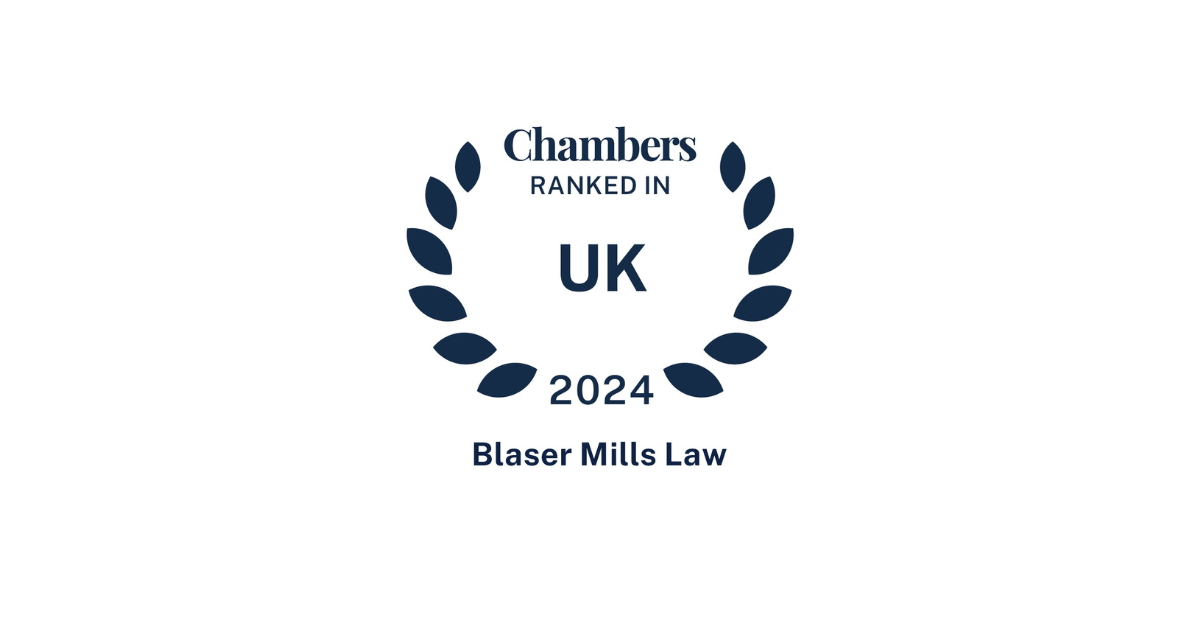The Legal 500, one of the UK’s leading legal directories, has announced its much-anticipated results for 2024. We are delighted to announce that we have achieved rankings in 12 practice areas and 27 of our lawyers have been recommended, achieving our best results to date.
Department rankings
The Legal 500 continues to award Top Tier 1 status to Employment and Wills, Trusts, and Probate.
The Legal 500 describes the Employment team as ‘exceptional’ with ‘vast amount of knowledge’. The team received a glowing testimonial from a former client ‘Excellent service from start to finish, very timely, very knowledgeable, feel very safe in their hands and that they have my best interests at heart’. Another client went on to say ‘From the first call through to resolution, the team is outstanding. The expertise of the team is invaluable…’.
The Wills, Trusts and Probate team have been complimented for their ‘calm, common sense approach’ and the Legal 500 highlights on the fact they are ‘strong across the board’. A client further praises the team on their ‘efficient and pragmatic approach’ whilst another client finds them ‘…very approachable.’
New rankings
We also welcome two brand new rankings for 2024 – Corporate & Commercial contracts and Insolvency.
Our Corporate and Commercial teams have been praised by the Legal 500 for their ‘integrity and accuracy’ highlighting Edward Lee as a ‘first-class corporate lawyer’. The team received many positive testimonials from former clients ‘The corporate team were willing to go the extra mile to ensure deals are completed. They are always available to offer advice and support’ … ‘Blaser Mills reacts unflinchingly. We feel they have our backs and are dogged and successful in the defence of our interests.’
The Legal 500 highlights on the Insolvency teams ‘very good depth of talent’ naming Jackie Ray as an ‘excellent and client-focused commercial lawyer’. Clients go on to say ‘The firm has excellent strength in terms of service provision and delivery. It has very good depth of talent at all levels of qualification.’
In addition, the following teams have retained their rankings, here is what our clients think:
Commercial Litigation (Tier 2): ‘Blaser Mills is excellent at delivering debt recovery solutions for clients, whether at volume or in one-off cases. They are adept at using a systems-based approach. The firm has excellent strength in terms of service provision and delivery. It has very good depth of talent at all levels of qualification.’
Property Litigation (Tier 4): ‘Blaser Mills Law have, in my experience, always proved to be extremely pro-active in all aspects of property litigation that we have been involved with. They have an extremely responsive team with a clear billing strategy.’
Debt Recovery (Tier 2): ‘We have used this practice for many years and have never had an issue or been disappointed with their service.’
Real Estate & Development (Tier 3).
Family & Divorce (Tier 2): ‘The team are boutique in a sense that they are able to offer clients a bespoke service, clients really appreciate a personal touch point, their solicitor becomes a true emotional connection rather than just a perfunctory service. They are a first-rate team.’
PI & Medical Negligence (Tier 3): ‘The clinical negligence team at Blaser Mills is very user-friendly, knowledgeable and experienced. They always put their clients first and will do everything to secure the best possible result for them.’
Criminal Defence (Tier 4): ‘Blaser Mills Law offers an outstanding service in relation to all criminal matters. Head and shoulders above ordinary high street practices.’
Contentious Trusts and Probate (Tier 4): ‘Any dealings with Blaser Mills have been easy at a very stressful time. The knowledge and the response times were fantastic.
Individual Rankings
Leading Individuals
The Legal 500 announced that James Simpson, Commercial Parnter, and Naim Qureshi, Senior Associate in Family & Divorce, have retained their rankings as Leading Individuals.
Naim’s received a excellent testimonial from a former client ‘Naim is wonderful and is an extremely safe pair of hands. He is very gentle and reassuring with clients but can be as robust as they come in representing them’.
Newly ranked Leading Individual Noel Deans, Partner and Head of Employment, has also received a glowing testimonial ‘Noel Deans is quietly confident, his knowledge of employment law has not gone unnoticed. He presents clear and unambiguous advice. Noel has outstanding knowledge, is calm, and understands the complexity of my case, providing me with a strategy that I endorse.’
In addition, Jonathan Gallop, Partner and Head of Wills, Trusts & Probate, has improved his ranking from Next Generation Partner to Leading Individual…‘Jonathan Gallop is very user friendly and responsive, with a calm, common sense approach’.
Rising Star
Our Rising Star for 2024 is Jade Salton-Brooks, Senior Associate in our Commercial Dispute Resolution team. Clients note Jade is ‘phenomenal’ and ‘truly excellent’ at what she does.
Recommended
Our 2024 Legal 500 rankings announced new individual lawyer recommendations across various practices.
Edward Lee, Partner & Head of Corporate: ‘Edward Lee’s experience is invaluable. Edward is a first class corporate lawyer who brings sensible commercial advice to the deal.’
Colin Smith, Partner & Head of Commercial: ‘Blaser Mills reacts unflinchingly. We feel they have our backs, and are dogged and successful in the defence of our interests.’
Ben Lindsay, Associate in our Employment: ‘Ben Lindsay was always available to provide support, guidance and updates in a timely, professional and helpful manner’.
Nina Toor, Senior Associate and Head of Commercial Recoveries: ‘Nina Toor is a very good junior lawyer, who is well attuned to clients’ needs.’
Olivia Dann, Lawyer Family & Divorce: ‘Olivia Dann handled my divorce and made an emotional process manageable with her gentle nature, understanding, and support in reaching the best possible outcome for me. I cannot thank Olivia enough for her approach in my vulnerable position. She is wise beyond her years and an excellent strategist.’
Juliana Pooler and Sara Davies, Property Litigation: ‘Blaser Mills Law have, in my experience, always proved to be extremely pro-active in all aspects of property litigation that we have been involved with. They have an extremely responsive team with a clear billing strategy.’
The following individuals have retained their recommended status: James Simpson, Noel Deans, Jonathan Gallop, Karen Woodison, Minesh Thakrar, Sara Rendell, Jackie Ray, Jonathan Lilley, Lucinda Holliday, Naim Qureshi, Victoria Harvey, Daria Stepien, Dave Matthews, Ben Langley, Emma Hurrell, Jade Salton-Brooks.
To our full rankings please visit: Blaser Mills Law > High Wycombe > England | The Legal 500 law firm profiles
Congratulations to all of those involved and thank you to our referee’s for their participation.









